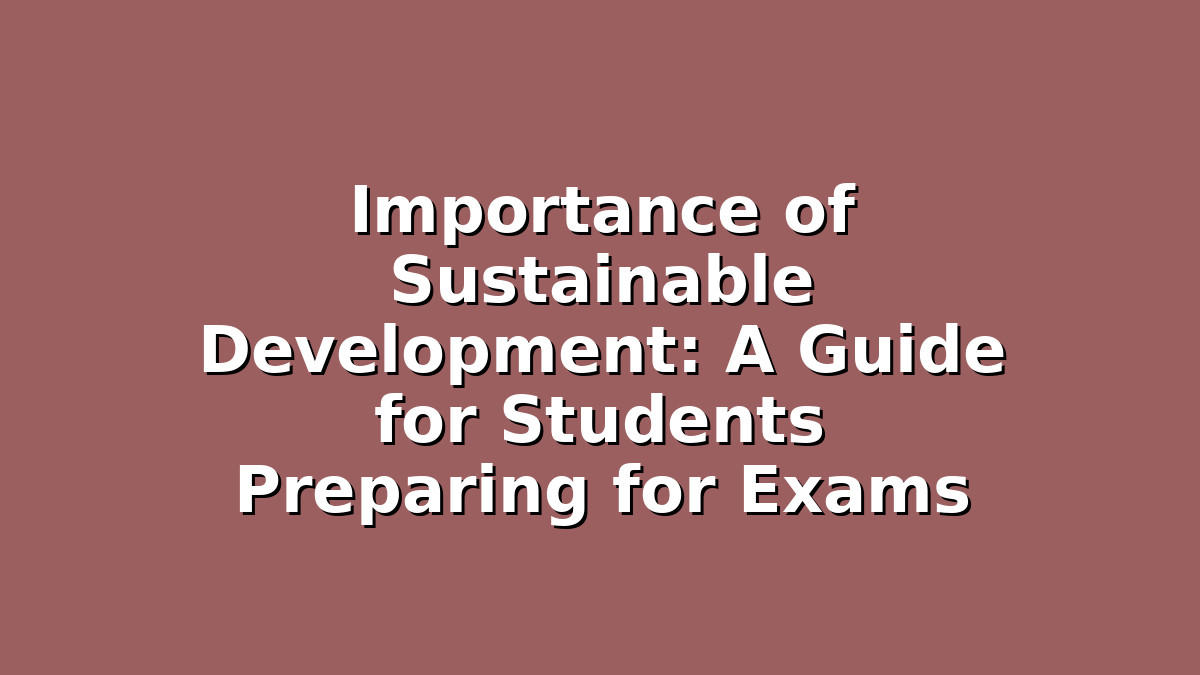As students, especially those preparing for exams, it’s easy to feel overwhelmed by textbooks, deadlines, and the pressure to perform well. Among the many topics you might encounter, sustainable development is one of increasing importance—not just for your studies, but for your future and the planet’s well-being. Understanding sustainable development not only helps you excel academically but also encourages you to think critically about how your generation can contribute to a better world. In this article, we’ll explore why sustainable development matters, how to effectively study this topic, and ways to incorporate sustainable habits into your learning routine.
What is Sustainable Development and Why Does it Matter?
Sustainable development refers to meeting the needs of the present without compromising the ability of future generations to meet their own needs. This concept balances economic growth, social inclusion, and environmental protection. As a student, grasping this idea is crucial because it connects to many subjects—geography, economics, science, social studies, and more. Moreover, global issues such as climate change, resource depletion, and social inequality are all intertwined with sustainable development.
Why is this important for exams? Many curricula now include sustainability as a key theme, reflecting worldwide efforts like the United Nations’ Sustainable Development Goals (SDGs). If you understand the principles behind sustainable development, you will be better prepared to answer questions, write essays, and engage in discussions on pressing global challenges.
Section 1: Effective Study Techniques for Sustainable Development Topics
Studying sustainable development can seem complex because it spans multiple disciplines. Here are some effective study tips specifically tailored to mastering this topic:
1. Break Down the Concept into Manageable Parts:
Try dividing sustainable development into its three pillars—economic, social, and environmental. Create separate notes for each pillar, highlighting key facts, examples, and case studies. This will make the material more digestible and easier to recall during exams.
2. Use Visual Aids:
Flowcharts, mind maps, and diagrams can help you better understand how different aspects of sustainable development relate to one another. For example, create a mind map linking economic activities to environmental impacts and social consequences. Visual tools often make abstract ideas more concrete.
3. Relate it to Real-Life Examples:
Exam questions often require you to apply concepts rather than just memorize definitions. Research current events, local initiatives, or global projects that promote sustainable development. For example, you could study how a community recycling program or renewable energy project contributes to sustainability. These examples will enrich your answers and show deeper understanding.
Section 2: Incorporating Sustainable Habits into Your Study Routine
Sustainable development isn’t just a topic to study—it’s a lifestyle approach that you can incorporate into your everyday habits, including your study routine. Here’s how adopting sustainable habits can benefit your academic performance and the environment:
1. Reduce Paper Waste:
Instead of printing all your notes and study materials, use digital tools such as tablets, laptops, or note-taking apps. This reduces paper consumption and clutter, making your study space more organized and eco-friendly.
2. Create a Sustainable Study Environment:
Set up your study space with energy-efficient lighting, recycle stationery, and use reusable water bottles and snacks packaging. A sustainable environment reduces distractions and helps you maintain focus and motivation.
3. Manage Your Time to Avoid Last-Minute Stress:
Sustainable development also involves using resources wisely, including your time and energy. Plan your study sessions in advance and take regular breaks. This prevents burnout and keeps your mind fresh, much like how sustainable practices protect natural resources for long-term use.
Section 3: How Understanding Sustainable Development Prepares You for the Future
The knowledge and habits you develop around sustainable development extend far beyond exams. Here’s why investing effort now pays off in the long run:
1. Enhances Critical Thinking and Problem-Solving Skills:
Studying sustainable development encourages you to analyze complex problems, weigh different viewpoints, and propose balanced solutions. These skills are invaluable not only in exams but also in future careers and life challenges.
2. Opens Opportunities for Career Paths:
Sustainability is a growing field with diverse career options in environmental science, public policy, urban planning, international development, and more. Early familiarity with the topic can help you decide if you want to pursue related studies or projects after school.
3. Empowers You to Make a Difference:
Perhaps most importantly, understanding sustainable development enables you to make informed choices that positively impact your community and the planet. Whether it’s advocating for green policies, reducing your carbon footprint, or participating in social initiatives, your knowledge empowers meaningful action.
Conclusion
Sustainable development is a vital subject for students preparing for exams and for those eager to make a positive impact on the world. By breaking down the concept, using effective study techniques, and adopting sustainable habits, you not only improve your academic performance but also contribute to a healthier planet. Remember, your generation holds the key to a sustainable future, and your studies are the foundation for that change. Stay curious, stay motivated, and let sustainability guide both your learning journey and your life.

Responses